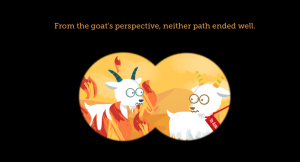The Internet Confessional Goes to the Goats
Generation Y? Generation X? Baby Boomer? Regardless of your assigned place in the generational world order, thanks to the accessibility of the Internet, we are all emerging as Generation “Look What I Did!” We brag or #humblebrag, to try to erase the ego of our online proclamations. And as we share content from our lives, we seek validation for our opinions, company for our perspectives and — in certain cases — atonement for our sins.
When blogging first emerged, it was fairly fringe; the word itself was still foreign enough to mainstream media stories that every article had to define it as “writing in a weblog, which is an online journal or diary.” I had friends who told me they wouldn’t read my blog, because they didn’t know how. “I don’t blog,” they’d explain. I told them they didn’t have to blog to read a blog, but it just didn’t sink in. Others asked, “Why would anyone start a blog? Who cares?” Today, some of those people have blogs themselves. As the technology became more and more accessible, the trend toward personal transparency intensified. People took journaling, a traditionally solitary and secret pursuit, and shared in semi-private or not-private-at-all online spaces. We gained access to the secret heartbeats of early bloggers, many of them teens and in their early 20s.
Soon, the Internet became a platform for sharing publicly, a pulpit that many of us never had before. People of all ages went from distrusting the Internet to making it their regular confessor. Sites and apps devoted entirely to confessing appeared. As one example, PostSecret arrived, a site that solicited postcard confessions from readers, and then posted those secrets online anonymously. Facebook and Twitter have become public spaces that users fill with confessions both poignant and inane, but all fundamentally human.
Other sites — such as Collegefession, CollegeConfesss (yes, that’s three S’es), GenXConfess — followed in the tradition of PostSecret. But it’s safe to say that only G-dcast took its confessional inspiration less from the increasingly transparent Internet culture and more from Jewish text and tradition. More than just a snazzy app, eScapegoat modernizes ancient text and ritual, as it acquaints users with the biblical story of how the High Priest would prepare for the High Holidays by laying hands on a goat, symbolically transferring the sins of Israel to the animal. The animal was then sent into the wilderness (although some note that this may have involved throwing the animal off a cliff), bearing the sins of Israel with it and leaving the people spiritually clean for Yom Kippur.
Today, eScapegoat prompts a connection with the reflective and penitent spirit of the High Holidays season. Visitors reflect on the year gone by and identify a sin for confession, then type their 140-character message into a window on the site and “send” their sin to the goat. These sins are then shared anonymously with the world via Twitter, provoking conversation about and identification with these very human failures that many are hoping to correct in the new year. I’ve been a fan since the app launched last year, and was delighted when they asked me to come on as a consultant this fall to help other people learn about the eScapegoat, its companion Twitter account, @SinfulGoat, and the kinds of misbehaviors on people’s minds as they approach a new Jewish year and the traditional season of repentance. One could write articles, blog posts or full High Holiday sermons about the behaviors to which people confess, running the gamut from very thoughtful and serious to more fun and even puerile. And in fact, that is what some rabbis did, using @SinfulGoat reports of misdeeds on Twitter as inspiration for High Holiday speeches, sharing the message that we are all human, flawed, and susceptible to daily corruptions, but that this season offers us the chance to revisit our bad decisions, and make better choices in the days and months ahead.
I, myself, confess a fascination with the sins of my fellow humans — over a thousand of them are queued up in the Twitter account, waiting to debut. I visit the feed daily, listening to their voices, feeling their regret and identifying with their struggles. The exposure to their humanity makes me feel more human, more imperfect, but in one of the most perfect ways possible.
Esther D. Kustanowitz is a freelance writer, editor and consultant who is working with G-dcast on eScapegoat this year.
![[the current issue of ZEEK]](../../image/2/100/0/5/uploads/leftistethicistgraphic-52842c6a.png)
- 5000 Pages of Zeek
- Founded in 2001, Zeek was the first Jewish online magazine, and we have over 5000 pages online to prove it, all available free of charge. Read more in the Archive.
More articles by
Esther D. Kustanowitz
More articles in
Faith and Practice
- To-Do List for the Social Justice Movement: Cultivate Compassion, Emphasize Connections & Mourn Losses (Don’t Just Celebrate Triumphs)
- Inside the Looking Glass: Writing My Way Through Two Very Different Jewish Journeys
- What Is Mine? Finding Humbleness, Not Entitlement, in Shmita
- Engaging With the Days of Awe: A Personal Writing Ritual in Five Questions
- The Internet Confessional Goes to the Goats



